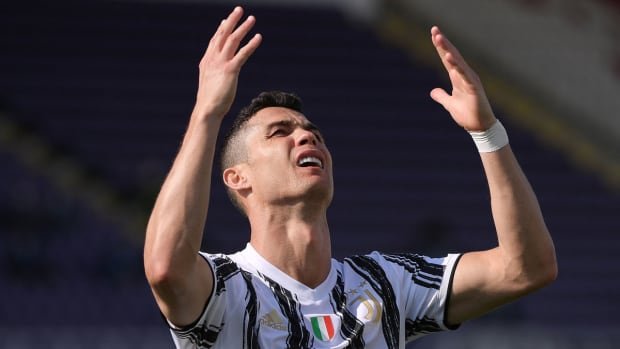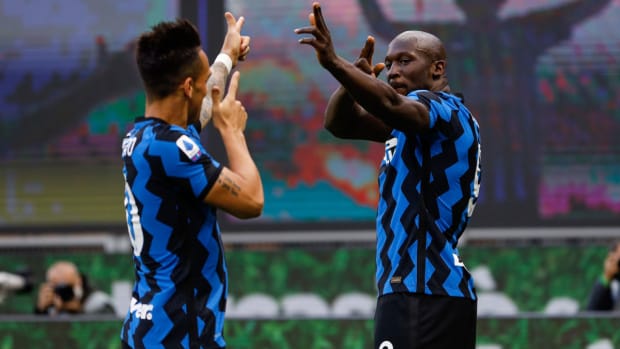Much can be made about how Juventus's domestic failure this season was self-inflicted, but Inter deserves all the credit for snapping Juve's nine-year run atop Serie A.
At last, the reign of Juventus is over. After nine successive Serie A titles, the end of its hegemony was confirmed on Sunday as Atalanta’s failure to beat Sassuolo handed Inter Milan its first scudetto since 2010. It was, perhaps, primarily a success of vindication. Coach Antonio Conte proved his point; Romelu Lukaku proved himself one of the best strikers in Europe; and a host of other Premier League castoffs played vital roles.
It would be easy to sneer and suggest the title was less won than it was bequeathed by a Juventus side in disarray, but that would be slightly unfair. Inter has wrapped up the title with four games to spare. It has lost only twice all season. It has run harder and further than anybody else in the division and has been by some distance the best side, playing modern, pressing football spearheaded by one of Europe’s best strike pairings. Lukaku and Lautaro Martínez are, essentially, Inter in microcosm: hard-working, powerful and far subtler than people give them credit for.
But equally it can’t be denied that Juve’s failings helped. Rarely in football can a position of such superiority have been squandered quite so casually. This was a club that almost seemed to get bored with winning the domestic title, to the extent that, even as it talked about prioritizing the Champions League, it began making increasingly whimsical decisions as though to entertain itself.

First, Cristiano Ronaldo was signed for €100 million on preposterous wages, a supposed last throw of the dice to bring the goals to guarantee European glory, but of course football doesn’t work like that. Ronaldo was 34, his range of movement severely curtailed, and that had a deleterious impact on the way the side played, particularly as there had to be cutbacks elsewhere in the squad to pay for him.
A year later, Max Allegri, having won five scudetti in five years, was eased out, apparently for the crime of failing to win the Champions League, although he had brought Juve to two finals. The appointment of Maurizio Sarri made no sense on any level. There was preexisting hostility between him and Juve fans, and his style of football was never going to be a fit with Ronaldo. Juve’s economic advantages remained such he could still win the league title, but in Europe there was more failure.
And then came the most bizarre appointment of all: Andrea Pirlo. That he was a great player is not in doubt, and it’s easy to see why it may have been thought that having somebody of such charisma and urbanity in charge would be good for the brand. But he had no coaching experience whatsoever. It wasn’t even that his appointment was part of some grand plan; he was shuffled into the job a week after being appointed as a Juve youth team coach. It may be that he goes on to become an excellent manager, but this particular job came far too early for him.
But still, Inter must be praised. Conte has now won top-flight titles with three clubs (Juventus, Chelsea, Inter) with his hard-pressing 3-5-2. The Champions League exit was a disappointment, but it may ultimately have benefited the club, particularly finishing fourth in the group so that there was no Europa League fixture congestion to worry about. Inter was able to focus on Serie A and responded with a four-month, 18-match unbeaten run in the league.

Lukaku, clearly, has been the standout player, working well with Martínez, both running beyond the Argentinian and holding the ball up for him. The Belgian has often seemed a slightly awkward figure, a player pigeonholed for his physique, but as he matures the sense is that he is learning to use his great strength as well as the more orthodox center-forward gifts that have often been overlooked. In 64 starts together, he and Martínez have scored or set up a total of 105 goals, 18 of them for each other.
But it’s not just the forwards. Achraf Hakimi has excelled at wingback; Alexis Sánchez has rediscovered some of the sharpness he lost at Manchester United; Nicolò Barella has been an important probing presence in midfield; the likes of Matteo Darmian, Ashley Young and Christian Eriksen have all made important contributions as well.
The question is what happens next. Inter’s debts are well over €600 million, and its parent company, Suning, disbanded its Chinese Super League side shortly after it won the title to reduce costs and focus on other aspects of the business. Conte has frequently sought additional investment, which is probably needed if Inter is to make an impact in the Champions League. But it may be that Inter ends up having to trim costs instead.
That, though, is for later. For now, there is just relief that even Inter’s capacity for messing up promising positions couldn’t intervene and that, for one year at least, Juventus's domestic domination has been stopped.
More Soccer Coverage:

0 Comments:
Post a Comment